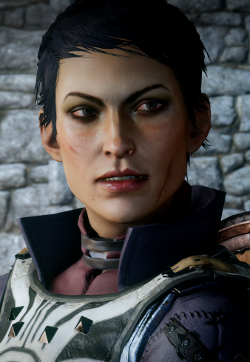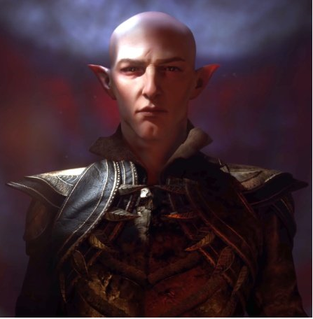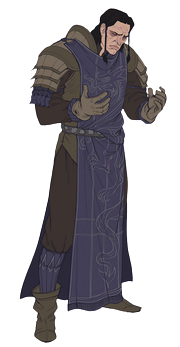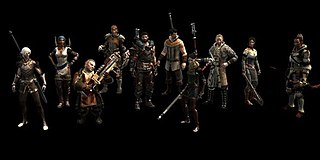Dragon Age is a media franchise centered on a series of fantasy role-playing video games created and developed by BioWare, which have seen releases on the Xbox 360, PlayStation 3, Microsoft Windows, OS X, PlayStation 4, and Xbox One. The franchise takes place on the fictional continent Thedas, and follows the experiences of its various inhabitants.

Dragon Age II is a 2011 action role-playing video game developed by BioWare and published by Electronic Arts (EA). It is the second major game in the Dragon Age series and the successor to Dragon Age: Origins (2009). Set in the world of Thedas, players assume the role of Hawke, a human mage, rogue, or warrior who arrives in the city of Kirkwall as a lowly refugee, and becomes its legendary champion over a turbulent decade of political and social conflict. In the game, players explore and engage in combat from a third-person perspective. Players encounter various companions, who play major roles in the game's plot and gameplay. Depending on players' decisions and dialogue, a companion will either recognize Hawke as a friend or a rival.

Dragon Age: Inquisition is a 2014 action role-playing video game developed by BioWare and published by Electronic Arts. The third major game in the Dragon Age franchise, Inquisition is the sequel to Dragon Age II (2011). The story follows a player character known as the Inquisitor on a journey to settle the civil unrest in the continent of Thedas and close a mysterious tear in the sky called the "Breach", which is unleashing dangerous demons upon the world. Dragon Age: Inquisition's gameplay is similar to its predecessors, although it consists of several semi-open worlds for players to explore. Players control the Inquisitor or their companions mainly from a third-person perspective, although a traditional role-playing game top-down camera angle is also available.

Alistair is a fictional character in Dragon Age, a role-playing video game series created by Canadian video game developer BioWare. He is introduced as one of many companions that can join the party of the player character in Dragon Age: Origins. Alistair is a Grey Warden who fought alongside The Warden against the Darkspawn to end the Fifth Blight. Alistair is eventually revealed to be the illegitimate child of King Maric, making him an heir to the throne of Ferelden. Depending on the player character's choices during the events of Dragon Age: Origins, Alistair may be installed as king of Ferelden, remain as a Grey Warden, become a wandering drunk, or be executed by Queen Anora.

Dragon Age: Inquisition, the third main video game in BioWare's Dragon Age series, is the most successful video game launch in BioWare history based on units sold. The game features a large number of characters who are members or potential allies of the organization known as the Inquisition; its formation was sanctioned by Divine Justinia V of the Andrastrian Chantry, the dominant religious organization in the Dragon Age series, prior to the events of Inquisition. The organization's primary purpose is to restore order to the continent of Thedas, the setting of Inquisition, where civil unrest and civil wars have already plunged entire nations and societies across the known world into chaos. A supernatural calamity in the beginning of Inquisition led to the deaths of the Divine and the majority of the Chantry leadership, and the subsequent opening of a mysterious metaphysical tear in the sky called the "Breach", which is unleashing dangerous demons upon the world and sends Thedas deeper into crisis.

Flemeth is a character in BioWare's Dragon Age franchise. She first appears in the 2009 novel The Stolen Throne as the Witch of the Wilds, a notorious sorceress who resides in the Korcari Wilds region within the Kingdom of Ferelden in the world of Thedas, and provides conditional aid to the novel's main characters when they pass through her territory. Her first video game appearance is Dragon Age: Origins, which is set several decades after the events of The Stolen Throne, and again aids the game's protagonists. She saves the Hawke family and guides them to Kirkwall, which sets the events of Dragon Age II in motion, and provides insight on how to defeat the main antagonist of Dragon Age: Inquisition. She is voiced by American actress Kate Mulgrew for all relevant media.

Cassandra Pentaghast is a fictional character in BioWare's Dragon Age franchise. She is the "Right Hand" of the Divine, the leader of the dominant religion in the Dragon Age setting, and a Seeker of Truth, an order of said religious organization. The character made her debut in 2011's Dragon Age II, where she appeared as part of the game's framing device. An anime film prequel, Dragon Age: Dawn of the Seeker, was released in 2012, covering the character's backstory. She appeared again in 2014's Dragon Age: Inquisition, where she serves as a party member. Cassandra makes a cameo appearance in the first episode of the 2022 Netflix animated series Absolution.

Varric Tethras is a fictional character from BioWare's Dragon Age franchise. The character made his debut in 2011's Dragon Age II, where he appeared as part of the game's framing device as the unreliable narrator of its plot. He also serves as a party member, a role which he reprises in its sequel, Dragon Age: Inquisition. In-universe, he is a renowned novelist as well as a self-appointed biographer to Hawke and the Inquisitor, the protagonists of Dragon Age II and Dragon Age: Inquisition respectively. Brian Bloom provides the voice for Varric in all media.

Leliana is a fictional character from BioWare's Dragon Age media franchise, first appearing as a party member in the 2009 role-playing game Dragon Age: Origins. A bard who is originally from the nation of Orlais, she came to Ferelden prior to the events of the Dragon Age series. Following the events of Leliana's Song, a DLC pack which serves as a prequel to the base game, she encounters the surviving Grey Wardens of Ferelden in the town of Lothering, and accompanies them to stop the monstrous Darkspawn from overrunning the world of Thedas. Leliana has appeared as a supporting character in subsequent video game sequels to Origins as well as other expanded media. She is voiced by French actress Corinne Kempa.

The Darkspawn are a fictional collective of humanoid monsters who serve as recurring antagonists of the Dragon Age video game media franchise, developed by BioWare and owned by Electronic Arts. Within the series, they mostly dwell in the subterranean realms beneath the world of Thedas, the setting of the Dragon Age series. The Darkspawn are depicted as malevolent and ugly creatures who are capable of infecting other beings with a supernatural disease known as the "Taint", which twist its victims into monstrous creatures. The supposed origins of the Darkspawn is presented in Dragon Age: Origins as a religious creation myth by the Chantry, the dominant religious organization of Thedas. The Darkspawn are portrayed as an overarching threat to the world of Thedas, as they periodically rise to the surface as a unified force led by an Archdemon, the corrupted form of ancient draconic beings once worshipped as deities by human civilizations in antiquity, killing indiscriminately and corrupting anything they encounter. The Darkspawn hordes are primarily opposed by the dwarven civilization of Thedas as well as the Grey Wardens, a sworn brotherhood of warriors formed to stop the rampaging hordes of monsters from overrunning the surface world by any necessary means.

Morrigan is a fictional character from BioWare's Dragon Age franchise, first appearing as a party member in Dragon Age: Origins. She is a shapeshifting Witch of the Wilds, one of several sorceresses whose legends originate in the Korcari Wilds region of the kingdom of Ferelden, the setting of Origins. Morrigan leaves her home to accompany the protagonist of Origins, the would-be Hero of Ferelden, at the request of her mother Flemeth to stop the monstrous Darkspawn from overrunning the world of Thedas. Morrigan also appears in Dragon Age: Inquisition as a supporting character. She is voiced by Claudia Black.

Dorian Pavus is a fictional character in BioWare's Dragon Age franchise. The character made his debut in the 2014 video game Dragon Age: Inquisition, where he serves as a companion and party member. Within the series, he is a human mage from a proud noble bloodline of the Tevinter Imperium, a realm governed by a powerful magic-using oligarchy situated in the northern region of Thedas, the continent in which the Dragon Age series is set in. A self-assured man born with magical virtuosity, he is nonetheless considered a pariah as his morals and ideals do not line up with the rest of his family nor the rest of the general populace living in Tevinter. Though he rejects the decadence and corruption which is prevalent throughout Tevinter society, he loves his homeland and wants his vision of a Tevinter where prejudices don't run rampant realized. Seeking to halt what he perceives as the moral decay of his countrymen and the fundamentalist zealotry of his former mentor, he decides to join the Inquisition, believing he could not return without first eliminating the forces corrupting his homeland.

Solas is a character in BioWare's Dragon Age franchise. He first appears in the 2014 video game Dragon Age: Inquisition, where he serves as a party member. He presents himself as an elven outlaw mage who operates outside of the edicts of the Chantry, the dominant religious organization in Thedas, the world setting of Dragon Age. Solas joins the Inquisition and serves as an expert on the Fade, a metaphysical realm that is tied to Thedas which is normally accessible only through dreaming, and its denizens. His knowledge and expertise prove instrumental in aiding the Inquisition's struggle to close the Breach, a massive dimensional tear in the sky that allows multitudes of demonic spirits to pass through into the physical world through dimensional rifts. A post-credit scene of Inquisition reveals his true identity as Fen'Harel. Trespasser, the final DLC pack released for Inquisition, provides further insight into his backstory and motives, as well as his involvement in the current world state of Thedas.

Loghain Mac Tir is a fictional character from BioWare's Dragon Age franchise. He hails from the kingdom of Ferelden, a realm in the world of Thedas, where the Dragon Age series is set. Loghain first appears in the 2009 novel The Stolen Throne as one of its main characters alongside his friend, King Maric Theirin. The novel's story is set during their youth, where Loghain served as Maric's right hand during Ferelden's war against the Orlesian Empire. He would next appear in The Calling, eleven years after King Maric and his companions ventured into the Deep Roads as described in The Stolen Throne, and eight years after the rebellion led by Prince Maric managed to liberate Ferelden from the Orlesians.

The Iron Bull is a fictional character in BioWare's Dragon Age franchise. He appears in the 2014 video game Dragon Age: Inquisition, where he serves as a companion party member. He is a Qunari, a member of metallic-skinned race of large humanoids that venerates a civil religion known as The Qun. The Qunari northern part of Thedas, the setting of the Dragon Age series. The Iron Bull is a spy commissioned by the Ben'Hassrath, the secret police of the Qunari government, to operate in southern Thedas. As part of his cover, he leads a mercenary company known as the Bull's Chargers. Freddie Prinze Jr. voices the character.

Cremisius "Krem" Aclassi is a fictional character in the 2014 video game Dragon Age: Inquisition. He is a former soldier in the Tevinter Imperium's military forces, and is currently a member of the Bull's Chargers, a mercenary company led by the Iron Bull. He was created and written by Patrick Weekes. Canadian-American voice actress Jennifer Hale voiced Krem in Inquisition.

Anders is a fictional character in BioWare's Dragon Age franchise. The character made his debut in Dragon Age: Origins – Awakening as a human mage pursued by members of the Templar Order, the military arm of the Chantry, which is the dominant religious organization in the Dragon Age series. He joins the player character as a party member. He appears again as a companion character in 2011's Dragon Age II.
Dragon Age II is an action role-playing video game developed by BioWare and published by Electronic Arts (EA) for Microsoft Windows, PlayStation 3, Xbox 360 and OS X. It is the second major game in the Dragon Age series and was released worldwide in March 2011. The game features a total of six downloadable content packs that were released from November 2009 to September 2010 on Xbox Live, PlayStation Network, and BioWare's website. Most of these content packs feature new quests and new locations for players to access in the base game, as well as new items for the player to make use of. Two story-focused content packs serve as standalone side stories from the base game, both of which advance the narrative of the Dragon Age series as a whole: Legacy, and Mark of the Assassin.

Dragon Age II, the second main video game in BioWare's Dragon Age series, features an ensemble cast of characters. Several returning characters from its antecedent Dragon Age: Origins may appear in a major or minor capacity, including Flemeth, Anders, Merrill, Isabela, Alistair, Zevran, Leliana, Marethari, Bodahn and Sandal Feddic.

Dragon Age: The Silent Grove is a six-issue heroic fantasy comic book limited series set in the Dragon Age universe. The first in a series of Dragon Age visual media to be published by Dark Horse Comics, it was originally an exclusive digital release between February and May 2012. The series was primarily written by David Gaider, with Alexander Freed as scriptwriter and artwork by Chad Hardin.



















